英汉笔译基础教程第12章文学翻译
- 格式:ppt
- 大小:879.00 KB
- 文档页数:5
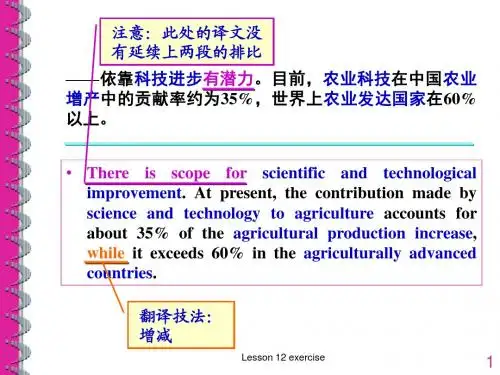
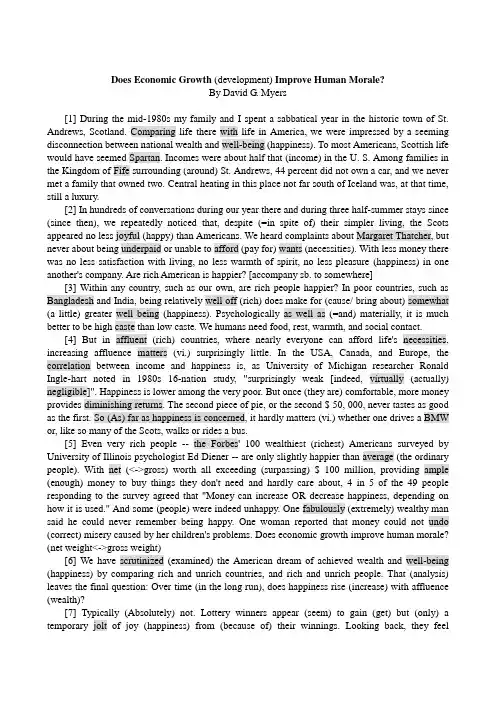
Does Economic Growth (development) Improve Human Morale?By David G. Myers[1] During the mid-1980s my family and I spent a sabbatical year in the historic town of St. Andrews, Scotland. Comparing life there with life in America, we were impressed by a seeming disconnection between national wealth and well-being (happiness). To most Americans, Scottish life would have seemed Spartan. Incomes were about half that (income) in the U. S. Among families in the Kingdom of Fife surrounding (around) St. Andrews, 44 percent did not own a car, and we never met a family that owned two. Central heating in this place not far south of Iceland was, at that time, still a luxury.[2] In hundreds of conversations during our year there and during three half-summer stays since (since then), we repeatedly noticed that, despite (=in spite of) their simpler living, the Scots appeared no less joyful (happy) than Americans. We heard complaints about Margaret Thatcher, but never about being underpaid or unable to afford (pay for) wants (necessities). With less money there was no less satisfaction with living, no less warmth of spirit, no less pleasure (happiness) in one another's company. Are rich American is happier? [accompany sb. to somewhere][3] Within any country, such as our own, are rich people happier? In poor countries, such as Bangladesh and India, being relatively well off (rich) does make for (cause/ bring about) somewhat (a little) greater well being (happiness). Psychologically as well as (=and) materially, it is much better to be high caste than low caste. We humans need food, rest, warmth, and social contact.[4] But in affluent (rich) countries, where nearly everyone can afford life's necessities, increasing affluence matters (vi.) surprisingly little. In the USA, Canada, and Europe, the correlation between income and happiness is, as University of Michigan researcher Ronald Ingle-hart noted in 1980s 16-nation study, "surprisingly weak [indeed, virtually (actually) negligible]". Happiness is lower among the very poor. But once (they are) comfortable, more money provides diminishing returns. The second piece of pie, or the second $ 50, 000, never tastes as good as the first. So (As) far as happiness is concerned, it hardly matters (vi.) whether one drives a BMW or, like so many of the Scots, walks or rides a bus.[5] Even very rich people -- the Forbes' 100 wealthiest (richest) Americans surveyed by University of Illinois psychologist Ed Diener -- are only slightly happier than average (the ordinary people). With net (<->gross) worth all exceeding (surpassing) $ 100 million, providing ample (enough) money to buy things they don't need and hardly care about, 4 in 5 of the 49 people responding to the survey agreed that "Money can increase OR decrease happiness, depending on how it is used." And some (people) were indeed unhappy. One fabulously (extremely) wealthy man said he could never remember being happy. One woman reported that money could not undo (correct) misery caused by her children's problems. Does economic growth improve human morale? (net weight<->gross weight)[6] We have scrutinized (examined) the American dream of achieved wealth and well-being (happiness) by comparing rich and unrich countries, and rich and unrich people. That (analysis) leaves the final question: Over time (in the long run), does happiness rise (increase) with affluence (wealth)?[7] Typically (Absolutely) not. Lottery winners appear (seem) to gain (get) but (only) a temporary jolt of joy (happiness) from (because of) their winnings. Looking back, they feeldelighted (happy) to have won. Yet the euphoria doesn't last (vi.). In fact, previously enjoyed activities such as reading may become less pleasurable (pleasant). Compared to the high (high spirit) of winning a million dollars, ordinary pleasures (become) pale.[8] On a smaller scale, a jump in our income can boost (promote/ increase) our morale, for a while (a short time). "But in the long run," notes Inglehart, "neither an ice cream cone nor a new car nor becoming rich and famous produces(bring about)the same feelings of delight that it initially did. Happiness is not the result of being rich, but a temporary consequence (result) of having recently become richer." Ed Diener's research confirms that those whose incomes have increased over a 10-year period are not happier than those whose income has not increased. Wealth, it therefore seems, is like health: Although its utter (complete) absence can breed (produce/ lead to) misery, having it does not guarantee happiness. Happiness is less a matter of getting what we want than of wanting (enjoy) what we have.Are we happier today?[9] We can also ask whether, over time, our collective (total/ comprehensive) happiness has floated upward (increase) with the rising economic tide. Are we happier today than in 1940, when two out of five homes (families) lacked a shower or bathtub, heat often meant feeding a furnace wood or coal, and 35 percent of homes had no toilet? Or consider 1957, when economist John Galbraith was about to describe the United States as The Affluent Society. Americans' per person income, expressed in today's dollars, was less than $ 8,000. Today it is more than $ 16, 000, thanks to increased real wages into the 1970s, increased nonwage income, and the doubling of married women's employment. Compared to 1957, we are therefore "the doubly affluent society"—with double what money buys including twice as many cars per person, not to mention microwave ovens, big screen color TVs, home computers, and $ 200 billion a year spent in restaurants and bars -- two and a half times our 1960 inflation-adjusted restaurant spending per person. From 1960 to 1990, the percentage of us with·dishwashers zoomed from 7 to 45 percent, (zoom in=enlarge<->zoom out)·clothes dryers rose from 20 to 69 percent,·air conditioners soared from 15 to 70 percent.Not best of times (for) the human spirit (morale)[10] So, believing that a little more money would make us a little happier, and having seen our affluence ratchet upward little by little over nearly four decades, are we now happier?[11] We are not (happy at all). Since 1957, the number telling the University of Chicago's National Opinion Research Center that they are "very happy" has declined from 35 to 30 percent. Twice as rich, and a little less happy. In fact, between 1956 and 1988, the percentage of Americans saying they were "pretty (very) well satisfied with your present financial situation" dropped from 42 to 30 percent. [live/ lead a happy/ miserable life][12] We are also more often downright (completely) miserable. Among Americans born since World War II, depression has increased dramatically –tenfold (ten times), reports University of Pennsylvania clinical researcher Martin Seligman. Today's 25-year-olds are much more likely (possible) to recall a time in their life when they were despondent (depressed) and despairing than are their 75-year-old grandparents, despite the grandparents having had many more years to suffer all kinds of disorder, from broken legs to the anguish of depression. Researchers debate the actualextent (degree) of rising depression... but no matter how we define depression, the findings (discoveries) persist. Today's youth and young adults have grown up with much more affluence, slightly less overall happiness, and much greater risk of depression, not to mention tripled teen suicide and all the other social pathologies we have considered (discussed). Never has a culture (nation) experienced such physical comfort combined with such psychological misery. Never have we felt so free, or had our prisons so overstuffed. Never have we been so sophisticated (complicated) about pleasure, or so likely to suffer broken relationships.[13] These are the best of times materially, "a time of elephantine (great) vanity and greed" observes Garrison Keillor, but they are not the best times for the human spirit. William Bennett, no critic of free market economies, is among those who recognize (find) the futility (uselessness) of economics without ethics and money without a mission (goal/ purpose): "If we have full employment and greater economic growth -- if we have cities of gold and alabaster -- but our children have not learned how to walk in goodness, justice, and mercy, then the American experiment, not matter how gilded (beautiful), will have failed." (1, 208 words)ABOUT THE AUTHORDavid Myers is a social psychologist and a communicator (writer) of psychological science to college students and the general public.EXERCISESAnswer the following questions or complete the following statements.1. What struck the author during his stay in St. Andrews, Scotland?A. The historic town of St. Andrews, Scotland.B. Obvious disconnection between national wealth and well-being.C. The natural beauty of St. Andrews, Scotland.D. The unwealthy yet peaceful life in St. Andrews, Scotland.2. What did the Scots think about their simple life?A. They were unsatisfied with the simple life and complained a lot.B. They blamed Margaret Thatcher for the poor living standard.C. They never complained, though they were unable co afford wants.D. They were happy and satisfied with their simple life.3. What's the difference that affluence makes between poor countries and rich ones?A. In poor countries, affluence matters surprisingly little while in rich countries affluence matters a great deal.B. In poor countries, affluence doesn't matter while in rich countries affluence matters a great deal.C. Increasing affluence means the same for people both in rich countries and in poor ones.D. Affluence makes great difference in poor countries while it matters surprisingly little in rich ones.4. What does the author imply by "The second piece of pie never tastes as good as the first."?A. You will never have the same feeling if you are full.B. Driving a BMW is the same as walking or riding a bike once you have enough to eat.C. Once people have enough income for comfortable life, then more income provides diminishing returns.D. For the poor people they will not refuse to have something more.5. What is the attitude of the wealthiest Americans towards money and happiness?A. Money could either increase or decrease happiness, depending on how it is used.B. Money could increase or decrease happiness, depending on how much money one owns.C. Money could not bring happiness but troubles.D. Money could bring neither happiness nor troubles.6. According to the author, what is the consequence of becoming rich?A. Troubles.B. A high spirit.C. Miseries.D. Temporary happiness.7. Why does the author say that wealth is like health?A. Health and wealth are both blessings, yet having both does not ensure happiness.B. The more wealth one has, the happier one is.C. One will never be happy if he is rich, but in poor health.D. Both money and health are essential to happiness.8. What are the causes of the rising income of Americans?A. Increased real wages and decreased nonwage income.B. Decreased nonwage income and working women.C. Increased nonwage income and more married working women.D. Increased real wages but decreased married women's employment.9. What is culturally typical of today's American society?A. More affluent and more comfortable.B. Physical comfort combined with psychological misery.C. More affluent yet less comfortable.D. More affluent and less psychologically depressed.10. What's the main idea of the passage?A. Wealth can't ensure the improvement of human morale.B. People in poor countries enjoy life more than those do in poor countries.C. Human beings need both health and wealth in order to have a happy life.D. It is the best time for human wealth as well as happiness.II. VocabularyA. Choose the best word from the tour choices to complete each of the following sentences.1. In 1977, I took my first ever _____ year and spent a couple of months at the Australian National University in Canberra.A. underpaidB. sabbaticalC. prosperousD. affluent2. He has had _____ opportunity to exercise leadership, which he almost invariably directs along positive channels, and has improved in the various skills.A. ampleB. utter (complete/ thorough)C. messyD. greedy3. Presumably (perhaps) they are paid their _____ salaries to spot (look for) errors such as these.A. despairingB. fabulous (unbelievable)C. depressingD. sympathetic4. It still depends on flow-patterns, even when the air is so thin as to be almost _____.A. diminishingB. tripledC. negligibleD. perceivable (=comprehensive)5. This would carry with it a responsibility on their part to help devise (design) the tests, or atleast to _____ their content.A. boost (increase/ promote)B. breadC. guaranteeD. scrutinize (examine)6. But he was already affected (influenced) by a(n) _____ which induced courage and recklessness.A. euphoriaB. mission (task)C. (idea->) ideologyD. bewilderment (confusion)7. Not only was there physical weakness but also intense loneliness and sometimes mental_____ due to (because of) lack of occupation (job) in the "workhouse" (workshop/ factory/ company) and the chronic sick wards.A. moraleB. enthusiasmC. starvation (=hanger)D. anguish(extreme pain)8. Worst of all is the sense (feeling) of utter (thorough) _____ because it is far too late to change anything.A. luxuryB. possessionC. futilityD. dominance9. The (mode<->) mood was (desperate->) despairing, _____ and war-weary pathetic (poor/pitiful) rather than rebellious.A. deficientB. destructiveC. despondent (depressed)D. declining (fall)10. She was born friendly and intelligent with none of the _____ so often associated with beautiful women.A. vanityB. casteC. lotteryD. eternity (eternal: adj.)B. Choose the best word or expression from the list given for each blank. Use each word or expression only once and make proper changes where necessary.well off necessity diminish undo persistwell-being underpay downright zoom delight1. This suggests that Sterling's strength, unwelcome though it seemed, may actually have been conductive (helpful) to Britain's economic well-being (health/ development).2. The coal miners complain that they are ridiculously underpaid, especially as the work is so dangerous.3. We have seen the value of our house diminish substantially (considerably) over the last six months.4. It's very difficult to u ndo (correct) the damage that's caused by inadequate (improper) parenting (parental education) in a child's early years.5. The company's benefits zoomed (increase) from nil (zero/ naught) in 1981 to about $ 16 million last year. (zoom in=enlarge; zoom out)6. But she was an orphan, and the uncle and aunt with whom she lived were not at all well off (rich).7. For some women at this stage, cooking can become an absorbing (attractive) hobby rather than the necessity of life it was when there were others to feed -- a social pleasure or simply (only) a personal indulgence (favor/ preference).8. Those words uttered (spoken) by some political leaders would sound banal (cliché) and from one or two others downright phony (adj. n. false).9. Call your doctor for advice if symptoms persist for more than a few days.10. Yet there is much of scenic and historic interest here to delight (make sb. happy/ happiness)the leisurely visitor. (scene->scenery->scenic)III. ClozeThere are ten blanks in the following passage. Read the passage ea fully and choose the best answer front the four chokes given below the passage.Millions of people, especially in cities, find that life has become a dizzying and exhausting (tiring/ tiresome) rush (run). This is particularly (especially) so in Western lands (countries). At a recent meeting in the United States, a speaker asked his audience to 1 raise their hands if they felt tired much of the time (most of the time). Instantly, 2 a sea of hands went up. (If you can make it in New York, you can make it anywhere else; make it=succeed/ make a living) The book Why Am I So Tired? says: "Modern life is full oflist is endless."In years 4 gone (passed) by, life was simpler, and the pace of life was slower. People tended to live more peacefully (live in harmony). Daytime was for work, and nighttime was for one's family and for bed. Today, there are a number of reasons why people feel 5 increasingly tired and fatigued.One factor may be that people sleep less. And one of the more significant (important) developments that caused the change was the, 6 arrival of the electric light. With the flick of a humans could control the length of the "day", and people soon began 7(=sitting up late). Indeed, many had little choice in the matter because factories began to operate 8 around the clock and service industries extended their hours.Other technological radio, TV, and the personal computer, havealso played a role (part) in10 turn up (turn out/ appear) at work sleepy and tired after a long night's viewing (watching). Home computers, and the endless distractions that they offer, also tempt (attract) millions to stay up late.1. A. rise B. arise C. raise D. arouse2. A. a sea of B. a flock of C. a bunch of D. a band of3. A. interests B. advances C. tensions D. conflicts4. A. to come B. gone by C. to go D. passed away5. A. greatly B. intensively C. increasingly D. comprehensively6. A. display B. arrival C. demonstration D. announcement7. A. keeping on B. staying up C. sitting about D. standing for8. A. the clock round B. against the clock C. by the clock D. around the clock9. A. disturbing B. dividing C. detecting D. depriving10. A. tune in B. tear off C. turn up D. take inIV. TranslationPut the following ports into Chinese.1. To most Americans, Scottish life would have seemed Spartan. Incomes were about half that in the U. S. Among families in the Kingdom of Fife surrounding St. Andrews, 44 percent did notown a car, and we never met a family that owned two. Central heating in this place not far south of Iceland was, at that time, still a luxury.对绝大多数美国人而言,苏格兰人的生活可称得上清贫,其收入大约仅为美国人的一半。
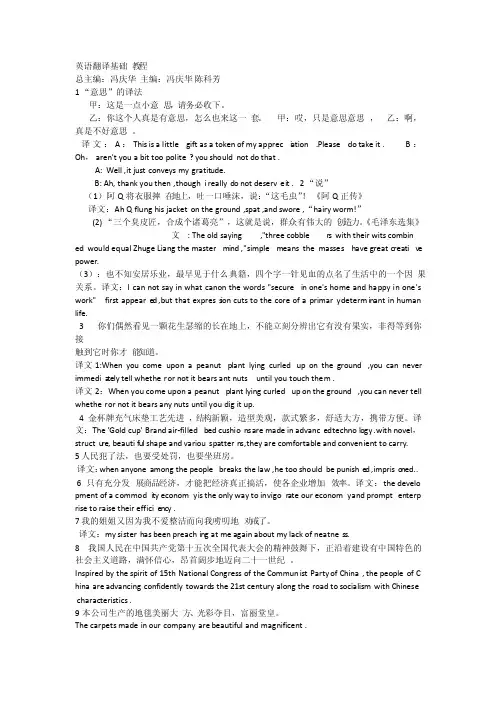
英语翻译基础教程总主编:冯庆华主编:冯庆华陈科芳1 “意思”的译法甲:这是一点小意思,请务必收下。
乙:你这个人真是有意思,怎么也来这一套。
甲:哎,只是意思意思,乙:啊,真是不好意思。
译文:A:This is a little gift as a token of my appreci a tion .Please do take it . B:Oh, aren't you a bit too polite ? you should not do that .A: Well ,it just conveys my gratitu de.B: Ah, thank you then ,though i really do not deserve it . 2 “说”(1)阿Q将衣服摔在地上,吐一口唾沫,说:“这毛虫”!《阿Q正传》译文:Ah Q flung his jacket on the ground ,spat ,and swore ,“hairy worm!”(2) “三个臭皮匠,合成个诸葛亮”,这就是说,群众有伟大的创造力。
《毛泽东选集》文: The old saying ,"three cobbler s with their wits combined would equal Zhuge Liang the mastermind ,"simple means the masses have great creativ e power.(3):也不知安居乐业,最早见于什么典籍,四个字一针见血的点名了生活中的一个因果关系。
译文:I can not say in what canon the words "securein one's home and happy in one's work" first appeare d ,but that express ion cuts to the core of a primary determinant in human life.3 你们偶然看见一颗花生瑟缩的长在地上,不能立刻分辨出它有没有果实,非得等到你接触到它时你才能知道。
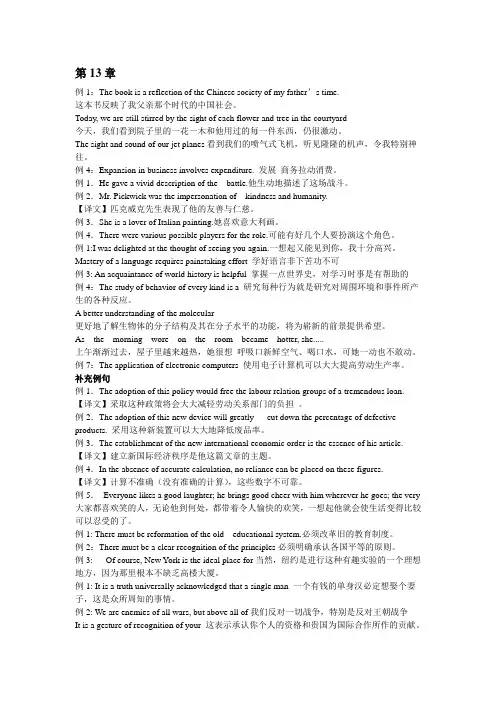
第13章例1:The book is a reflection of the Chinese society of my father’s time.这本书反映了我父亲那个时代的中国社会。
Today, we are still stirred by the sight of each flower and tree in the courtyard今天,我们看到院子里的一花一木和他用过的每一件东西,仍很激动。
The sight and sound of our jet planes看到我们的喷气式飞机,听见隆隆的机声,令我特别神往。
例4:Expansion in business involves expenditure. 发展商务拉动消费。
例1.He gave a vivid description of the battle.他生动地描述了这场战斗。
例2.Mr. Pickwick was the impersonation of kindness and humanity.【译文】匹克威克先生表现了他的友善与仁慈。
例3.She is a lover of Italian painting.她喜欢意大利画。
例4.There were various possible players for the role.可能有好几个人要扮演这个角色。
例1:I was delighted at the thought of seeing you again.一想起又能见到你,我十分高兴。
Mastery of a language requires painstaking effort 学好语言非下苦功不可例3: An acquaintance of world history is helpful 掌握一点世界史,对学习时事是有帮助的例4:The study of behavior of every kind is a 研究每种行为就是研究对周围环境和事件所产生的各种反应。

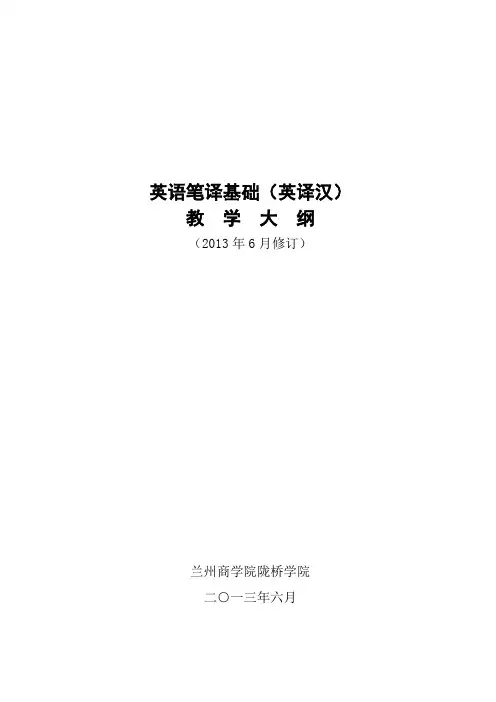
英语笔译基础(英译汉)教学大纲(2013年6月修订)兰州商学院陇桥学院二○一三年六月一、课程基本信息课程名称:英语笔译基础(英译汉)课程编码:0411056课程类别:专业主干课,必修课程计划总学时:54学时课程学分:3适用专业:英语专业(翻译方向)课程归属系(部):外国语言文学系本课程是否有单独的实验(实训、实习)教学大纲:无二、课程性质、目的和任务《英语笔译基础(英译汉)》是为英语专业翻译方向高年级学生的一门专业必修课。
课程力求理论与实践相结合,传授基本的翻译知识及常用的方法和技巧,通过反复实践培养学生的翻译熟练技能。
以翻译知识为先导,英汉语言的对比为基础,翻译技巧为主干,通过讲解、范文赏析、译文对比、练习和讲评等具体措施为学生打开思路,提高双语的转换能力,使学生们掌握必要的翻译知识与技能。
通过介绍汉英两种语言的对比与分析以及不同翻译方法,结合大量实践对所学内容进行练习和巩固,使学生能够掌握翻译的基本技巧,培养学生英汉翻译基本技能。
同时,还要注重培养学生严谨的学风,避免不求甚解、逐词死译和望文生义,从而切实提高学生的翻译水平,将学生培养成合格的翻译人才。
三、本课程与相关课程的关系后续课四、课程考核方式本课程为院级考试课;本课程考采用形成性评价和终结性评价相结合的考核方式。
总评成绩由平时成绩和期末考试成绩两部分构成,其中平时成绩占40%(含考勤、作业、课堂表现、测验等),期末考试成绩占60%。
五、学时分配一览表六、建议教材及教学参考书目(一)建议教材王恩冕.大学英汉翻译教程(第三版)[M].北京:对外经济贸易大学出版社,2009.(二)教学参考书目[1] 冯庆华.实用翻译教程(修订版)[M].上海:上海外语教育出版社,2006.[2] 许建平.英汉互译实践与技巧[M].北京:清华大学出版社,2000.[3] 程永生.汉译英理论与实践教程(第一版)[M].北京:外语教学与研究出版社,2005.七、课程教学内容第一章翻译概论教学目的与要求:使学生基本了解我国翻译简史,并掌握翻译定义与分类、翻译的悖论和翻译的标准。
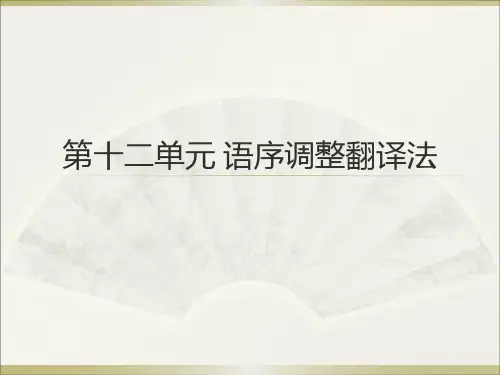
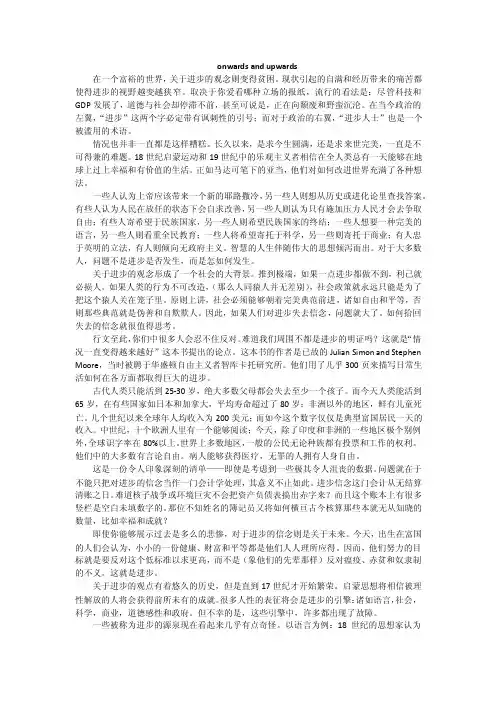
onwards and upwards在一个富裕的世界,关于进步的观念则变得贫困。
现状引起的自满和经历带来的痛苦都使得进步的视野越变越狭窄。
取决于你爱看哪种立场的报纸,流行的看法是:尽管科技和GDP发展了,道德与社会却停滞不前,甚至可说是,正在向颓废和野蛮沉沦。
在当今政治的左翼,“进步”这两个字必定带有讽刺性的引号;而对于政治的右翼,“进步人士”也是一个被滥用的术语。
情况也并非一直都是这样糟糕。
长久以来,是求今生圆满,还是求来世完美,一直是不可得兼的难题。
18世纪启蒙运动和19世纪中的乐观主义者相信在全人类总有一天能够在地球上过上幸福和有价值的生活。
正如马达可笔下的亚当,他们对如何改进世界充满了各种想法。
一些人认为上帝应该带来一个新的耶路撒冷,另一些人则想从历史或进化论里查找答案。
有些人认为人民在放任的状态下会自求改善,另一些人则认为只有施加压力人民才会去争取自由;有些人寄希望于民族国家,另一些人则希望民族国家的终结;一些人想要一种完美的语言,另一些人则看重全民教育;一些人将希望寄托于科学,另一些则寄托于商业;有人忠于英明的立法,有人则倾向无政府主义。
智慧的人生伴随伟大的思想倾泻而出。
对于大多数人,问题不是进步是否发生,而是怎如何发生。
关于进步的观念形成了一个社会的大背景。
推到极端,如果一点进步都做不到,利己就必损人。
如果人类的行为不可改造,(那么人同猿人并无差别),社会政策就永远只能是为了把这个猿人关在笼子里。
原则上讲,社会必须能够朝着完美典范前进,诸如自由和平等,否则那些典范就是伪善和自欺欺人。
因此,如果人们对进步失去信念,问题就大了。
如何拾回失去的信念就很值得思考。
行文至此,你们中很多人会忍不住反对。
难道我们周围不都是进步的明证吗?这就是“情况一直变得越来越好”这本书提出的论点。
这本书的作者是已故的Julian Simon and Stephen Moore,当时被聘于华盛顿自由主义者智库卡托研究所。
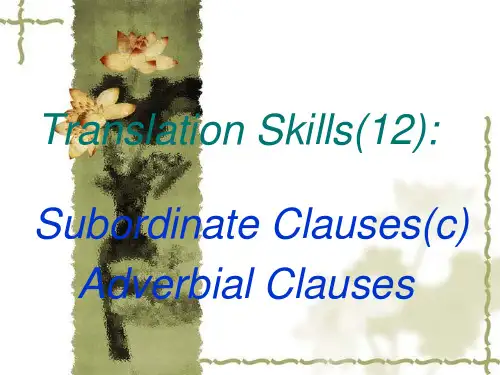
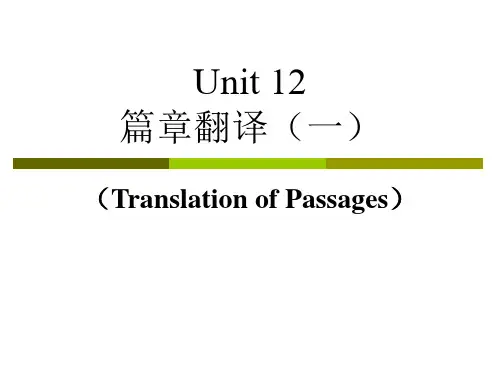

第十二讲西方翻译理论简介(三)巴斯内特:翻译研究文化转向的风向标一、苏姗·巴斯内特简介苏姗·巴斯奈特(Susan Bassnett)是文化翻译学派的领军人物,在国际译坛有深远影响。
苏姗·巴斯内特于上世纪80年代,在英国华威大学(Warwick University)创建了翻译与比较文化研究中心,她年轻时曾在欧洲几个国家接受过教育,此教育背景使她掌握了多种语言,深入了解多种文化,这为她后来的翻译及比较文化研究打下了良好的基础。
她的学术生涯从意大利开始,后来到美国工作了一段时间,二十世纪八十年代到英国华威大学任教至今。
她的研究范围包括:翻译研究、女性戏剧、女性作品、拉美文学、游记、英国研究。
她的成名著作《翻译研究》(Translation studies,1980)已再版八次,该书到现在仍然是翻译学界一本权威性的著作。
在过去二十多年,Susan Bassnett在翻译研究领域中不断地架起接通各个研究途径的桥梁,并提出了连接其他领域的跨学科研究的呼吁。
1 990年,她有创见地建议,翻译研究应“转向文化研究”。
随着她和Andre Lefevere二人合作编辑的《翻译、历史与文化》论文集的问世,翻译研究领域出现了真正的突破:翻译研究正式转向文化研究。
到了九十年代后期,Bassnett和Lelevere二人合著的《文化建构一一文学翻译论集》(Constructing Cultures—Essays on Literary Translation)出版,Susan Bassnett在第八章<文化研究中的翻译转向>一文中指出,在过去三十多年,翻译学领域的学者们已经取得了相当大的学术成就,可提供给文化研究领域的学者们在探讨跨文化交流时作参考。
目前文化研究的重点问题是权力的关系和文本的生产,而翻译研究学者们对这些问题已不陌生。
翻译研究应该从边缘走向舞台的中心。
翻译研究已经作出了文化转向,现在该是文化研究朝翻译研究转向了。